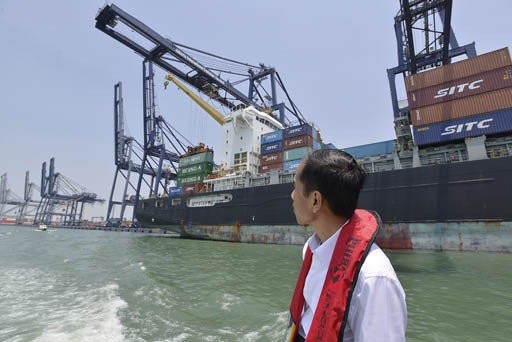Popular Reads
Top Results
Can't find what you're looking for?
View all search resultsPopular Reads
Top Results
Can't find what you're looking for?
View all search resultsJokowi’s 7% growth dream slips further away
Change text size
Gift Premium Articles
to Anyone
If infrastructure bottlenecks get solved, Indonesia can expect to enjoy growth of 7 percent. That’s the theory.
The theory, a target President Joko “Jokowi” Widodo aims to achieve before the end of his tenure in 2019, has proven difficult to realize, especially as the government and the central bank recently lowered economic growth forecasts.
The 2017 state budget features an economic growth target of between 5.3 and 5.9 percent, lower than the previous figures of 5.5 to 5.9 percent.
The central bank recently trimmed growth projection for this year to between 5 and 5.4 percent from the previous 5.2 percent to 5.6 percent.
Due to this, economists have begun to suggest that continuing to push for 7 percent growth would be unsustainable and unhealthy. However, the government maintains its optimistic attitude.
“Don’t lose hope, life will be difficult if we lose hope,” Finance Minister Bambang Brodjonegoro said after he presented the 2017 state budget material to the House of Representatives on Friday.
The government is banking on its economic stimulus packages to lure investments and that its efforts to boost consumption will also stoke the nation’s economic growth. It has also jacked up spending on infrastructure projects to get economic activities going.
The tax amnesty bill, currently being deliberated at the House of Representatives (DPR) is also expected to boost growth, with the aim of attracting billions dollars of wealthy Indonesians’ illicit cash back into the country from overseas by pardoning past tax arrears.
The broader picture, however, is not as supportive. Slow growth has been projected for the global economy this year and commodity prices remain under pressure.
At 4.92 percent in the first quarter, domestic economic growth also fell below expectations as both investment and domestic consumption growth were insufficient to offset an exports plunge.
Indonesia saw the slowest growth in six years in 2015 at 4.79 percent.
“It will be very hard to achieve the government’s 7 percent growth target by 2019,” said Samuel Asset Management economist Lana Soelistianingsih.
During the commodity supercycle in 2012, Indonesia’s economy expanded by only 6.2 percent, she added.
The structure of the Indonesian economy can not jack up its growth rate to 7 percent yet, Lana said, emphasizing that this was due to the country’s high dependence on imports, especially raw materials and intermediary products.
Higher growth means increased industrial activities that require more imports. Meanwhile, higher imports would place further risk on foreign exchange reserves, current account deficit and the rupiah value against the US dollar.
“It’s okay to be in an economy like today, as long as it’s stable,” Lana said.
Enny Sri Hartati, the executive director of the Institute for Development of Economics and Finance (INDEF), has a different take on higher growth.
She said it was possible for the economy to grow faster, citing that Indonesia’s peers in Southeast Asia had managed to record more than 6 percent growth in the quarter.
The key for the short-term is to boost consumption, according to Enny, as it could trigger demand and eventually boost many industries.
“The government is stuck on global economic problems, lower commodity prices. It is not serious and creative enough to generate consumption at home,” Enny added.
Domestic consumption accounts for more than half the country’s gross domestic product (GDP), followed by investment — around a third — then net exports and government spending, according to data from the Central Statistics Agency (BPS).










